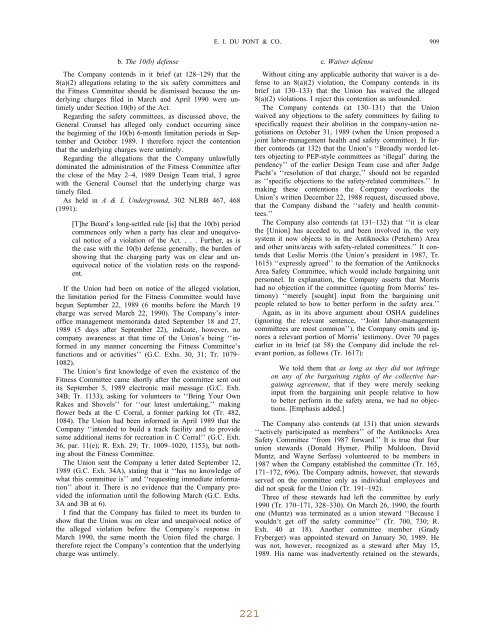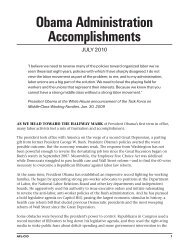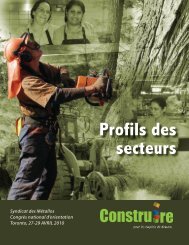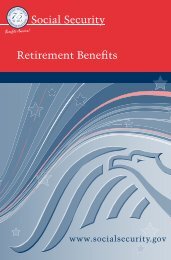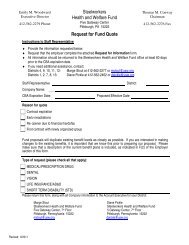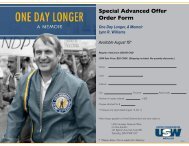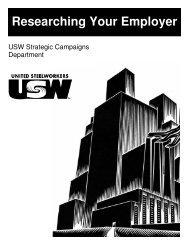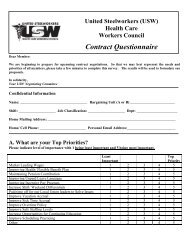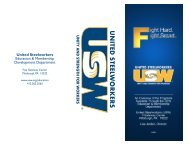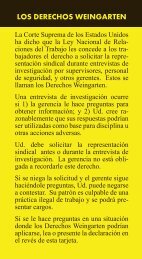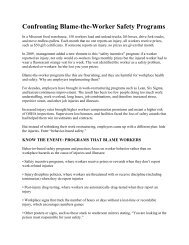Union Approach to Health and Safety: - United Steelworkers
Union Approach to Health and Safety: - United Steelworkers
Union Approach to Health and Safety: - United Steelworkers
You also want an ePaper? Increase the reach of your titles
YUMPU automatically turns print PDFs into web optimized ePapers that Google loves.
E. I. DU PONT & CO.<br />
909<br />
b. The 10(b) defense<br />
The Company contends in it brief (at 128–129) that the<br />
8(a)(2) allegations relating <strong>to</strong> the six safety committees <strong>and</strong><br />
the Fitness Committee should be dismissed because the underlying<br />
charges filed in March <strong>and</strong> April 1990 were untimely<br />
under Section 10(b) of the Act.<br />
Regarding the safety committees, as discussed above, the<br />
General Counsel has alleged only conduct occurring since<br />
the beginning of the 10(b) 6-month limitation periods in September<br />
<strong>and</strong> Oc<strong>to</strong>ber 1989. I therefore reject the contention<br />
that the underlying charges were untimely.<br />
Regarding the allegations that the Company unlawfully<br />
dominated the administration of the Fitness Committee after<br />
the close of the May 2–4, 1989 Design Team trial, I agree<br />
with the General Counsel that the underlying charge was<br />
timely filed.<br />
As held in A & L Underground, 302 NLRB 467, 468<br />
(1991):<br />
[T]he Board’s long-settled rule [is] that the 10(b) period<br />
commences only when a party has clear <strong>and</strong> unequivocal<br />
notice of a violation of the Act. . . . Further, as is<br />
the case with the 10(b) defense generally, the burden of<br />
showing that the charging party was on clear <strong>and</strong> unequivocal<br />
notice of the violation rests on the respondent.<br />
If the <strong>Union</strong> had been on notice of the alleged violation,<br />
the limitation period for the Fitness Committee would have<br />
begun September 22, 1989 (6 months before the March 19<br />
charge was served March 22, 1990). The Company’s interoffice<br />
management memor<strong>and</strong>a dated September 18 <strong>and</strong> 27,<br />
1989 (5 days after September 22), indicate, however, no<br />
company awareness at that time of the <strong>Union</strong>’s being ‘‘informed<br />
in any manner concerning the Fitness Committee’s<br />
functions <strong>and</strong> or activities’’ (G.C. Exhs. 30, 31; Tr. 1079–<br />
1082).<br />
The <strong>Union</strong>’s first knowledge of even the existence of the<br />
Fitness Committee came shortly after the committee sent out<br />
its September 5, 1989 electronic mail message (G.C. Exh.<br />
34B; Tr. 1133), asking for volunteers <strong>to</strong> ‘‘Bring Your Own<br />
Rakes <strong>and</strong> Shovels’’ for ‘‘our latest undertaking,’’ making<br />
flower beds at the C Corral, a former parking lot (Tr. 482,<br />
1084). The <strong>Union</strong> had been informed in April 1989 that the<br />
Company ‘‘intended <strong>to</strong> build a track facility <strong>and</strong> <strong>to</strong> provide<br />
some additional items for recreation in C Corral’’ (G.C. Exh.<br />
36, par. 11(e); R. Exh. 29; Tr. 1009–1020, 1153), but nothing<br />
about the Fitness Committee.<br />
The <strong>Union</strong> sent the Company a letter dated September 12,<br />
1989 (G.C. Exh. 34A), stating that it ‘‘has no knowledge of<br />
what this committee is’’ <strong>and</strong> ‘‘requesting immediate information’’<br />
about it. There is no evidence that the Company provided<br />
the information until the following March (G.C. Exhs.<br />
3A <strong>and</strong> 3B at 6).<br />
I find that the Company has failed <strong>to</strong> meet its burden <strong>to</strong><br />
show that the <strong>Union</strong> was on clear <strong>and</strong> unequivocal notice of<br />
the alleged violation before the Company’s response in<br />
March 1990, the same month the <strong>Union</strong> filed the charge. I<br />
therefore reject the Company’s contention that the underlying<br />
charge was untimely.<br />
c. Waiver defense<br />
Without citing any applicable authority that waiver is a defense<br />
<strong>to</strong> an 8(a)(2) violation, the Company contends in its<br />
brief (at 130–133) that the <strong>Union</strong> has waived the alleged<br />
8(a)(2) violations. I reject this contention as unfounded.<br />
The Company contends (at 130–131) that the <strong>Union</strong><br />
waived any objections <strong>to</strong> the safety committees by failing <strong>to</strong><br />
specifically request their abolition in the company-union negotiations<br />
on Oc<strong>to</strong>ber 31, 1989 (when the <strong>Union</strong> proposed a<br />
joint labor-management health <strong>and</strong> safety committee). It further<br />
contends (at 132) that the <strong>Union</strong>’s ‘‘Broadly worded letters<br />
objecting <strong>to</strong> PEP-style committees as ‘illegal’ during the<br />
pendency’’ of the earlier Design Team case <strong>and</strong> after Judge<br />
Pacht’s ‘‘resolution of that charge,’’ should not be regarded<br />
as ‘‘specific objections <strong>to</strong> the safety-related committees.’’ In<br />
making these contentions the Company overlooks the<br />
<strong>Union</strong>’s written December 22, 1988 request, discussed above,<br />
that the Company disb<strong>and</strong> the ‘‘safety <strong>and</strong> health committees.’’<br />
The Company also contends (at 131–132) that ‘‘it is clear<br />
the [<strong>Union</strong>] has acceded <strong>to</strong>, <strong>and</strong> been involved in, the very<br />
system it now objects <strong>to</strong> in the Antiknocks (Petchem) Area<br />
<strong>and</strong> other units/areas with safety-related committees.’’ It contends<br />
that Leslie Morris (the <strong>Union</strong>’s president in 1987, Tr.<br />
1615) ‘‘expressly agreed’’ <strong>to</strong> the formation of the Antiknocks<br />
Area <strong>Safety</strong> Committee, which would include bargaining unit<br />
personnel. In explanation, the Company asserts that Morris<br />
had no objection if the committee (quoting from Morris’ testimony)<br />
‘‘merely [sought] input from the bargaining unit<br />
people related <strong>to</strong> how <strong>to</strong> better perform in the safety area.’’<br />
Again, as in its above argument about OSHA guidelines<br />
(ignoring the relevant sentence, ‘‘Joint labor-management<br />
committees are most common’’), the Company omits <strong>and</strong> ignores<br />
a relevant portion of Morris’ testimony. Over 70 pages<br />
earlier in its brief (at 58) the Company did include the relevant<br />
portion, as follows (Tr. 1617):<br />
We <strong>to</strong>ld them that as long as they did not infringe<br />
on any of the bargaining rights of the collective bargaining<br />
agreement, that if they were merely seeking<br />
input from the bargaining unit people relative <strong>to</strong> how<br />
<strong>to</strong> better perform in the safety arena, we had no objections.<br />
[Emphasis added.]<br />
The Company also contends (at 131) that union stewards<br />
‘‘actively participated as members’’ of the Antiknocks Area<br />
<strong>Safety</strong> Committee ‘‘from 1987 forward.’’ It is true that four<br />
union stewards (Donald Hymer, Philip Muldoon, David<br />
Muntz, <strong>and</strong> Wayne Serfass) volunteered <strong>to</strong> be members in<br />
1987 when the Company established the committee (Tr. 165,<br />
171–172, 696). The Company admits, however, that stewards<br />
served on the committee only as individual employees <strong>and</strong><br />
did not speak for the <strong>Union</strong> (Tr. 191–192).<br />
Three of these stewards had left the committee by early<br />
1990 (Tr. 170–171, 328–330). On March 26, 1990, the fourth<br />
one (Muntz) was terminated as a union steward ‘‘Because I<br />
wouldn’t get off the safety committee’’ (Tr. 700, 730; R.<br />
Exh. 40 at 18). Another committee member (Grady<br />
Fryberger) was appointed steward on January 30, 1989. He<br />
was not, however, recognized as a steward after May 15,<br />
1989. His name was inadvertently retained on the stewards,


